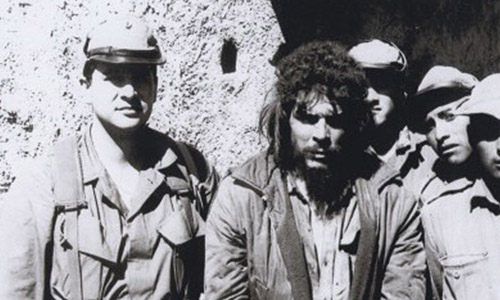
“Che” Guevara (Ernesto Guevara de la Serna y Lynch, 1928-1967). Argentine revolutionary, Cuba’s former minister of industries, guerrilla theoretician, and Fidel Castro’s trusted adviser. Born on June 14 in Rosario, Argentina, of Spanish and Irish descent, he suffered from asthma, spending his childhood in a mountain town near Rosario. At an early age he read history and sociology books in the family library, being particularly influenced by the poetry of Chilean Communist Pablo Neruda. In 1952 he broke off his medical studies at the University of Buenos Aires to set off with a friend on a transcontinental trip that included motorcycling to Chile, riding a raft on the Amazon, and taking a plane to Florida. He retuned to his studies in Argentina, graduating Doctor of Medicine and Surgery in 1953. Late that year he left his country for good, moving to Guatemala, where he supported the leftist Arbenz regime and had his first experience of war. When Arbenz was overthrown, Che sought asylum in the Argentine embassy until he could travel to Mexico to attend a medical conference. In Mexico he met Fidel and Raúl Castro and agreed to be their doctor on the Granma expedition against Batista. With the consummation of the Revolution of 1959 he was one of the firs rebel commanders to enter Havana and take control of the capital.
Guevara held several posts in the new government: commander of la Cabana fortress, president of the Banco Nacional (November 26, 1958, signing currency bills “Che”), industry minister (February 23, 1961), and always one of Castro’s most influential advisers. At La Cabana he presided over the execution of several hundred Cubans. As industry minister he pursued a poorly thought out policy of import substitution by way of rapid industrialization, which was contrary to the USSR’s policy for Cuba, and advocated the supremacy of moral over material incentives to increase production. In the fall of 1960 he visited Communist countries to build up trade relations. As minister he attended the 1961 organization of American States Conference in Punta del Este, Uruguay. He also masterminded Cuba’s subversive program in Latin America and wrote extensively on this subject. His first book, Guerra de guerrillas (1960) provided basic instructions, and claimed the Cuban experience as proof that rural guerrilla campaigns can defeat conventional armies. His official tasks did not cure him of his restlessness. In December 1964 he set out on a long journey to Europe, Africa, and Asia. He criticized the Soviet Union for not supporting the armed struggle. After his return to Cuba he surprisingly disappeared from public view. His wanderings next took him to Portuguese Guinea (the future Guinea Bissau) and the Belgian Congo. He returned and prepared a team of Cuban army officers to accompany him on his next expedition, to Bolivia (where he arrived November 1966). He expected that a spreading guerrilla operation there would force U.S. intervention, creating “two, three, or many Vietnams.” Instead, the United States provided the Bolivian army with arms and training in counterinsurgency. Despite initial success, the guerrillas failed to gain peasant support and were tracked down and killed or captured by the Bolivians. Che was captured on October 8, 1967 and executed the next day. In 1997 his body was recovered, brought back to Cuba, and buried with full military honors in Santa Clara.
Some have labeled him a restless incompetent, promoted by Castro for the propaganda value of his looks, romantic rhetoric and as, in his Argentine nationality, a symbol of Latin American solidarity, only to be repudiated and abandoned by Castro in Bolivia as soon as he had ceased to be useful.








